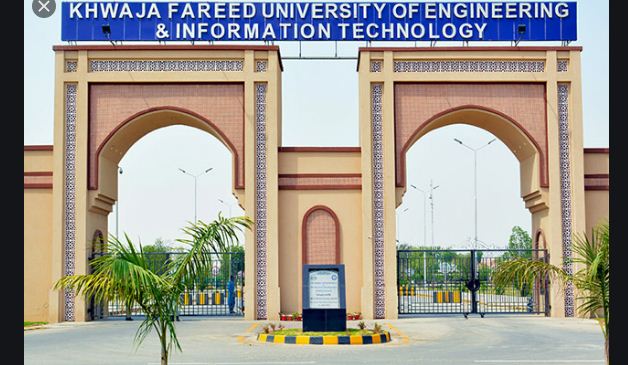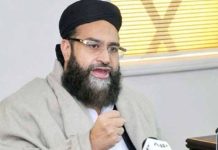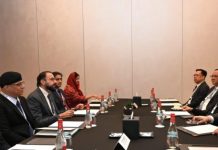RAHIM YAR KHAN, FEB 2 (DNA) – World Interfaith Harmony Week is an annual event observed during the first week of February. World Interfaith Harmony Week (WIHW), conceived to promote peace and nonviolence, was first proposed by King Abdullah II of Jordan at the United Nations in 2010.
Recognizing the imperative need for dialogue among different faiths and religions to enhance mutual understanding, harmony and cooperation among people, the General Assembly encourages all States to spread the message of interfaith harmony and goodwill in the world’s churches, mosques, synagogues, temples and other places of worship during that week, voluntarily and according to their religious traditions or convictions.
The World Interfaith Harmony Week provides a platform—one week in a year—when all interfaith groups and other groups of goodwill can show the world what a powerful movement they are. This week will allow for these groups to become aware of each other and strengthen the movement by building ties and avoiding duplicating each others’ efforts.
To celebrate the Interfaith Harmony Week and to spread the message of peace and harmony of Khwaja Ghulam Fareed (R.A) to all corners of the world, Khwaja Fareed University of Engineering and Information Technology cohosted a virtual international conference on 2nd February 2021. The conference was organized in collaboration with ‘The Universal Peace Federation International’, ‘Coalition of Faith-Based Organizations’, ‘International Association of Parliamentarians for Peace’ and LIOS-SOIL Organization. KFUEIT provided IT resources and consultancy for the virtual conference. Over 500 international participants from 27 different countries registered and attend the virtual conference. The daylong conference consisted of two sessions.
The first session covered the discussion on the topic of “Interfaith Cooperation for Securing Peace in the 21st Century”. The speakers for this session were Prof. Dr. Mohammad Nizamuddin former Chairman PHEC & Pro-Rector Superior University Lahore Pakistan, Ms. Prof. Dr. Basmah Ahmed Mohammed Jastaniah Professor of Umm Al Qura University Makkah Saudia Arabia, Bishop Humphrey Sarfaraz Peters President Bishop Church of Pakistan & Bishop of Peshawar Pakistan, Ms. Prof. Dr. Roida Rzayeva Oktay Azerbaijan National Academy of Sciences Baku Azerbaijan, Ms. Prof. Dr. Musferah Mehfooz Professor of Islamic Studies COMSATS University Lahore Pakistan, Rev. Prof. Dr. Zaka Ahuche Peter Head of Public Theology Department Nigeria, Ms. Prof. Dr. Konul Bunyadzade Department Head of Islamic Philosophy National Academy of Sciences Azerbaijan and Dr. Ismath Ramzy Senior Lecturer University of Malaya (UM) Kuala Lumpur Malaysia.
The second session discussion was on “Role of Faith-Based Organizations in Social Support and Combating Crimes. The speakers of the session were Prof. Dr. Abul Saboor Dean Faculty of Social Sciences PMAS Arid Agriculture University Rawalpindi Pakistan, Prof. Dr. Ridwan al-Makassary Research Coordinator on Public Policy Jayapura Indonesia, Ms. Dr. Zainab Moin Lecturer Fatima Jinnah Women University Rawalpindi Pakistan, Sahibzada Sultan Ahmed Ali Chairman (Research Think Tank) MUSLIM Institute (Islamabad-London) Pakistan, Dr. Allapitchay Mohamed Mihlar Vice-Principal Zahira College Colombo Sri Lanka, Ms. Tabassum Parveen, Researcher working on the Political Economy of Arab Gulf states Qatar and Dr. Shahid Habib Khwaja Fareed University of Engineering & Information Technology Rahim Yar Khan Pakistan.
All speakers highlighted the importance of interfaith harmony. It is impossible to develop a prosperous world without peace. For a peaceful world, it is necessary to develop a culture of tolerance and to promote interfaith harmony.
It is the duty of each individual of society as well as all institutions of state to spread awareness. Vice chancellor Khwaja Fareed University Prof. Dr. Suleman Tahir appreciated the efforts of the conference organizing team and said that it is the need of time to spread awareness about interfaith harmony.
It will bring peace, prosperity, culture of tolerance and would strengthen the bonds of society for a prosperous and bright future. To spread awareness among students, KFUEIT will work on the theme not only in this particular week but for the whole year because it is a social and moral responsibility of each educational institution.=DNA
============

















